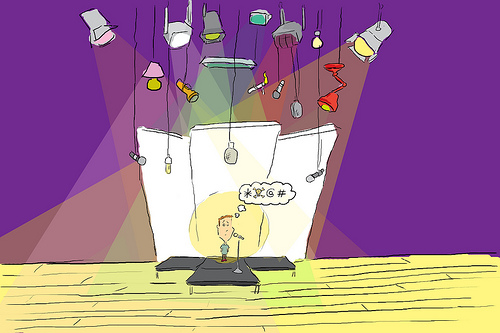Most people would not see an awful movie a second time, yet they play the same bad memories over and over in their heads. – Tony Robbins

Ever been that person? Ever been paralyzed or intimidated or just plain scared? All because of a bad memory, of something which happened a long time ago? Let it go.
What does that mean?
We’ve all seen a bad movie, once. But do you go back and see it again and again and again? Not usually, right?
That is what this quote is about, the repeated viewing of a bad movie or a bad memory. Neither makes much sense, but many more people go over a bad memory time and time again.
To me, the life/movie is a good parallel, as nearly all of us have a life, and most of us have seen a bad movie. The question becomes why will we refuse to go back to watch a bad movie, but will go back to watch a bad memory?
What if we could walk out of a bad memory, just like we might walk out of a bad movie? It can be done, with varying degrees of success. And a lot of effort. I have done it, and I believe you can as well.
Why is letting go important?
We forget things all the time. If I asked you what was the worst movie you ever saw, would you even remember it? Perhaps if it was bad in some specific aspect, and spectacularly so, you might remember that part. But could you remember it, scene by scene, like you probably could for your favorite movie?
What if you could forget bad memories, or reduce them to a single image in your mind? What if you could forgive and forget, and move on with your life? I know it is possible, as I have done it, both on accident and on purpose. And I imagine you have as well, even if you don’t think of it in that manner.
I hope to inspire you to let go of the troubling aspects of your bad memories. By letting go of the troubling parts, you can concentrate on the good parts. Even my worst memories have good parts, even if it’s only the way they helped me become a better person, or helped me to stretch beyond what I thought my limits were. Gratitude for these good thing can go a long way to helping you let go.
Where can I apply this in my life?
We all have memories that are less than helpful. Specific examples might be the memory of saying something stupid when you met someone, so you don’t start conversations anymore. Or a memory of being frightened when standing in front of a group of people, so you won’t do public speaking. Even if you don’t have those memories, I imagine that you have a few others as well.
What would you do differently if you were not haunted by the memory? Would you be more outgoing? Would you be a little less afraid of public speaking? Those were just a few of the bad memories I have mostly overcome. While I will discuss what I did, there are plenty of other methods, including some ideas in the ‘related articles’ section at the bottom of the post.
The big question is what memory do you want to work on? Of all the things that play back in your head, which one do you want to try first? Do you go for the worst one, and get it reduced in some manner? Or do you want to start with a kind of practice run, and so choose something smaller?
Most of the time, something which bothers us is bright, vivid, loud, and a movie. The technique I was taught (by the author of the quote) was to mess with the movie. Play it at a different speed. I found it actually got funny when it went so fast that everyone sounded like chipmunks. Perhaps going slower would work better for you.
The point is to make it feel less real. You should also try to mute the colors. Diminish the bright vibrant colors to pastels, and eventually to black and white. Over time, even the black and white can fade to a more uniform gray. You can even let the images go out of focus. As the colors fade, the memory also starts to fade.
Instead of a movie, break it into a series of snap-shots. Then work on reducing the number of pictures in the set. There is usually sound, so work on that as well. You can muffle the sound, like your fingers were in your ears, or you can simply make it more and more quiet. The point is to make it less and less lifelike, and to make it less intimidating.
Some parts will stay around longer than others, and some might not want to go away. That is where letting go comes in. Yes, bad things happen, but it is over now. As you work on reducing your bad memory in as many of the ways as you can, consider forgiving yourself, and everyone else involved. That can be hard to do, but it makes forgiving easier.
If all this still doesn’t help you, please consider seeking professional assistance with your bad memory. Life should be fun and adventurous, however you may define those terms. The emotions associated with your bad memories should fade after you learn from the experience.
From: Twitter, @Descavish113
confirmed at : quoted in Speaking Mastery, entry #7, 3rd page from the end http://www.scribd.com/doc/21374372/Time-Management as well as heard directly from the source by the blogger.
Photo by Victor Jeg
Related articles
- Stop Repetitive Bad Memories (wikihow.com)
- Why Ruminating is Unhealthy and How to Stop (psychcentral.com)
- The Forgetting Pill (wired.com)
- Influence and Memories (dbonearchives.wordpress.com)







Great post!
Glad you liked it. Thanks, as always for stopping by, and for leaving a comment. Until next time!
Hmmm, the internet censors got busy. All I see is a block. Must not have the proper font installed. ;O
Thanks for stopping by again. And for leaving a block. I like blocks. I prefer LEGO, but that’s just me.
LOL. Sorry, my emoticons come out as blocks sometimes. The block was a smile 🙂 God bless you! (smile)
A likely story. 8) Thanks!